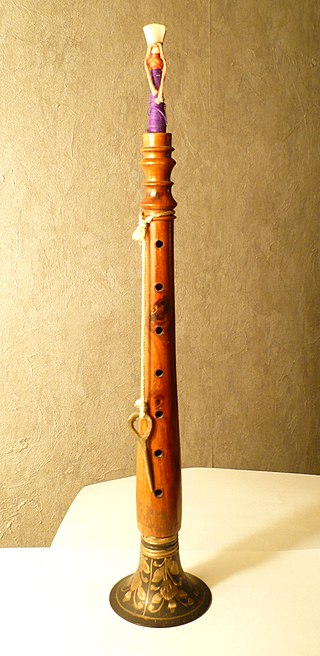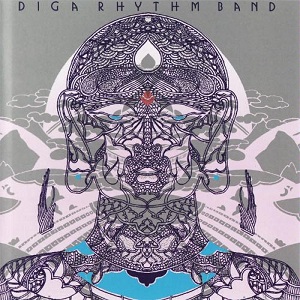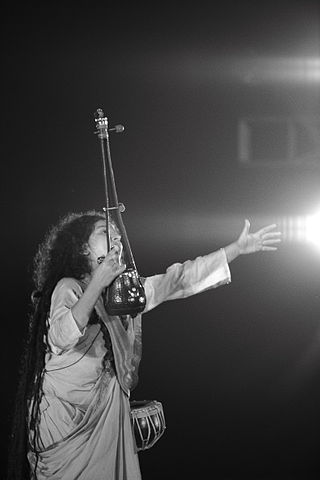
A percussion instrument is a musical instrument that is sounded by being struck or scraped by a beater including attached or enclosed beaters or rattles struck, scraped or rubbed by hand or struck against another similar instrument. Excluding zoomusicological instruments and the human voice, the percussion family is believed to include the oldest musical instruments. In spite of being a very common term to designate instruments, and to relate them to their players, the percussionists, percussion is not a systematic classificatory category of instruments, as described by the scientific field of organology. It is shown below that percussion instruments may belong to the organological classes of ideophone, membranophone, aerophone and cordophone.

The Baul are a group of mystic minstrels of mixed elements of Sufism, Vaishnavism and Tantra from Bangladesh and the neighboring Indian states of West Bengal, Tripura and Assam's Barak Valley and Meghalaya. Bauls constitute both a syncretic religious sect of troubadours and a musical tradition. Bauls are a very heterogeneous group, with many sects, but their membership mainly consists of Vaishnava Hindus and Sufi Muslims. They can often be identified by their distinctive clothes and musical instruments. Lalon Shah is regarded as the most celebrated Baul saint in history.

The shehnai is a musical instrument, originating from the Indian subcontinent. It is made of wood, with a double reed at one end and a metal or wooden flared bell at the other end. Its sound is thought to create and maintain a sense of auspiciousness and sanctity and as a result, is of nine instruments found in the royal court. The shehnai is similar to South India's nadaswaram.

Folk music of Haryana has two main forms: classical folk music of Haryana and desi folk music of Haryana. They take the form of ballads and pangs of parting of lovers, valor and bravery, harvest and happiness.

Allauddin Khan, also known as Baba Allauddin Khan was an Indian sarod player and multi-instrumentalist, composer and one of the most notable music teachers of the 20th century in Indian classical music. For a generation many of his students, across different instruments like sitar and violin, dominated Hindustani classical and became some of the most famous exponents of the form ever, including Ravi Shankar and Ali Akbar Khan.
Badal Roy was an Indian tabla player, percussionist, and recording artist known for his work in jazz, world music, and experimental music.

Indian folk music is diverse because of India's enormous cultural diversity. It is sung in various languages and dialects throughout the length and breadth of this vast nation and exported to different parts of the world owing to migration.

The kuzhal is a traditional double reed wind instrument used in the south Indian state of Kerala. It is similar in construction to a nagaswaram or a large shehnai, and has a very shrill and penetrating tone.

The naqareh, naqqāra, nagara or nagada is a Middle Eastern drum with a rounded back and a hide head, usually played in pairs. It is thus a membranophone of the kettle drum variety.

A tabla is a pair of twin hand drums from the Indian subcontinent, that are somewhat similar in shape to the bongos. Since the 18th century, it has been the principal percussion instrument in Hindustani classical music, where it may be played solo, as accompaniment with other instruments and vocals, and as a part of larger ensembles. It is frequently played in popular and folk music performances in India, Bangladesh, Afghanistan, Pakistan, Nepal and Sri Lanka. The tabla is an essential instrument in the bhakti devotional traditions of Hinduism and Sikhism, such as during bhajan and kirtan singing. It is one of the main qawali instrument used by Sufi musicians. The instrument is also featured in dance performances such as Kathak. Tabla is a rhythmic instrument.
Aref Durvesh is a celebrated and prolific tabla artist who has recorded and performed with Badmarsh & Shri, Sting, Susheela Raman, Cheb Mami, Jeff Beck, Visionary Underground, and is also one of the longest-serving members of Nitin Sawhneys band, having performed on all of his albums as well as all his UK and international tours. His father was a musician, a disciple of Bismillah Khansahib, and a world-renowned shehnai player. Aref grew up with Indian music all around him and fell in love with tabla. Aref has taken traditional tabla performance into a new dimension by integrating it into contemporary urban music, jazz, hip hop and fusion, as well as being a virtuoso in the traditional skills. He is now extending his talents to producing his own album and performing live under his own name, while continuing to tour with Nitin and Shusheela.
The pat waing or pat wang is a drum circle instrument used in the Burmese folk musical ensemble. This instrument has been adapted into the Thai piphat mon ensemble, where it is called poeng mang.

Pandit Divyang Vakil is a Tabla and Rhythm maestro renowned globally for his intricate rhythm compositions; a Guru of Taalvidya'; Spirituality and Philosophy.

Diga is an album by the Diga Rhythm Band, a percussion-based music ensemble led by Grateful Dead drummer Mickey Hart and by Zakir Hussain. It was released by Round Records as a vinyl LP in 1976. It was remixed and released on CD by Rykodisc Records in 1988.
Anant Lal, often referred to by the title Pandit, was an Indian classical musician who played the shehnai. He worked for All India Radio and played with artists such as Ravi Shankar and Debu Chaudhuri in addition to recording under his own name. Lal was one of the leading exponents of the shehnai in Hindustani classical music. In 1989, he received the Sangeet Natak Akademi Award, the highest recognition afforded artists in India.

Parvathy Baul is a Baul folk singer, musician and storyteller from Bengal and one of the leading Baul musicians in India. Trained under Baul gurus, Sanatan Das Baul, Shashanko Goshai Baul in Bengal, she has been performing both in India and other countries since 1995.

"Mantra" is a 1993 song and single by Material from the album Hallucination Engine, composed by Bill Laswell and Lakshminarayana Shankar. "Mantra" received favourable reviews in Spin, The Wire and Stereophile. The album version was remixed by The Orb to a 17-minute track for the single, and also given a 5-minute version.

Subhen Chatterjee is an Indian percussionist and tabla player. Chatterjee began his training on the tabla in his childhood, studying with Swapan Chaudhuri. In 1985 he created the fusion band Karma. He has accompanied the vocalist Girija Devi on several recordings including Songs of Varanasi for Nimbus Records. He has also recorded with V.M. Bhatt and Matt Malley on the album Sleepless Nights for World Village Records. His album Artistry recorded live in Kansas City with Manilal Nag on sitar, Ramesh Mishra on sarangi and Chatterjee on tabla was nominated for a Grammy Award in 2002.












